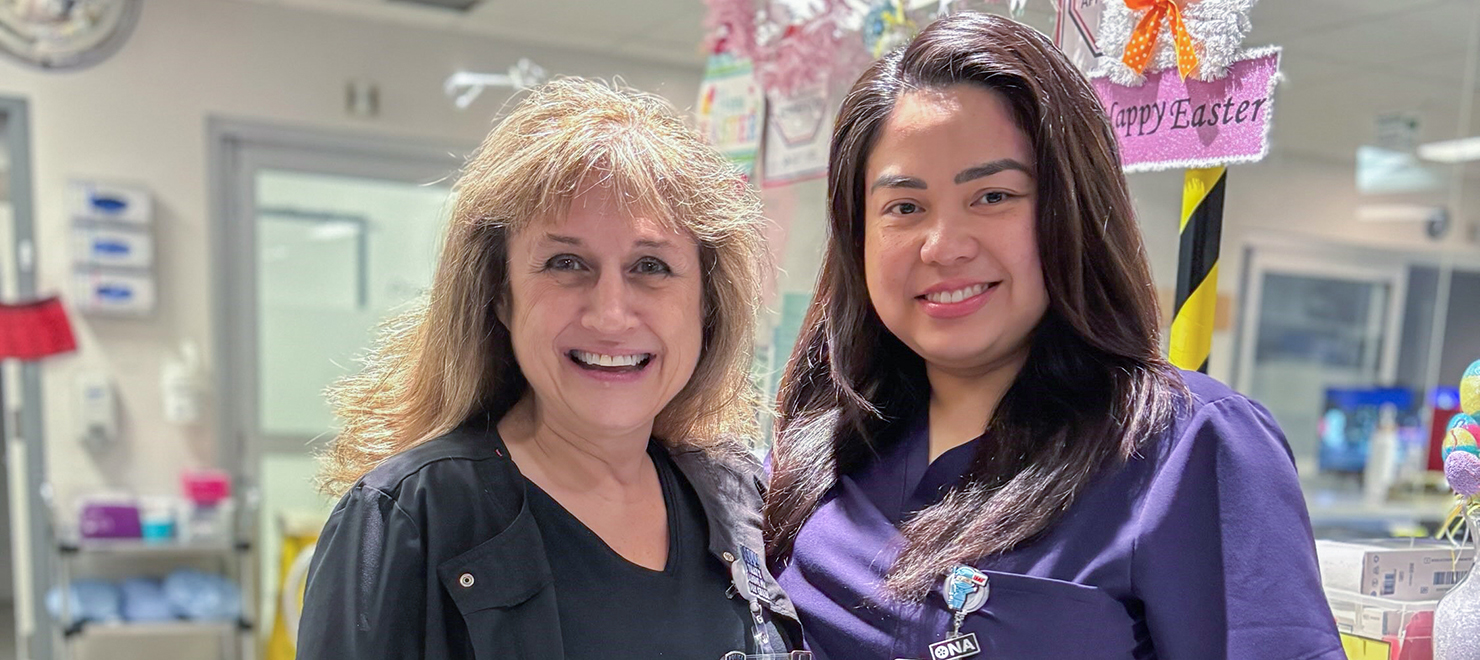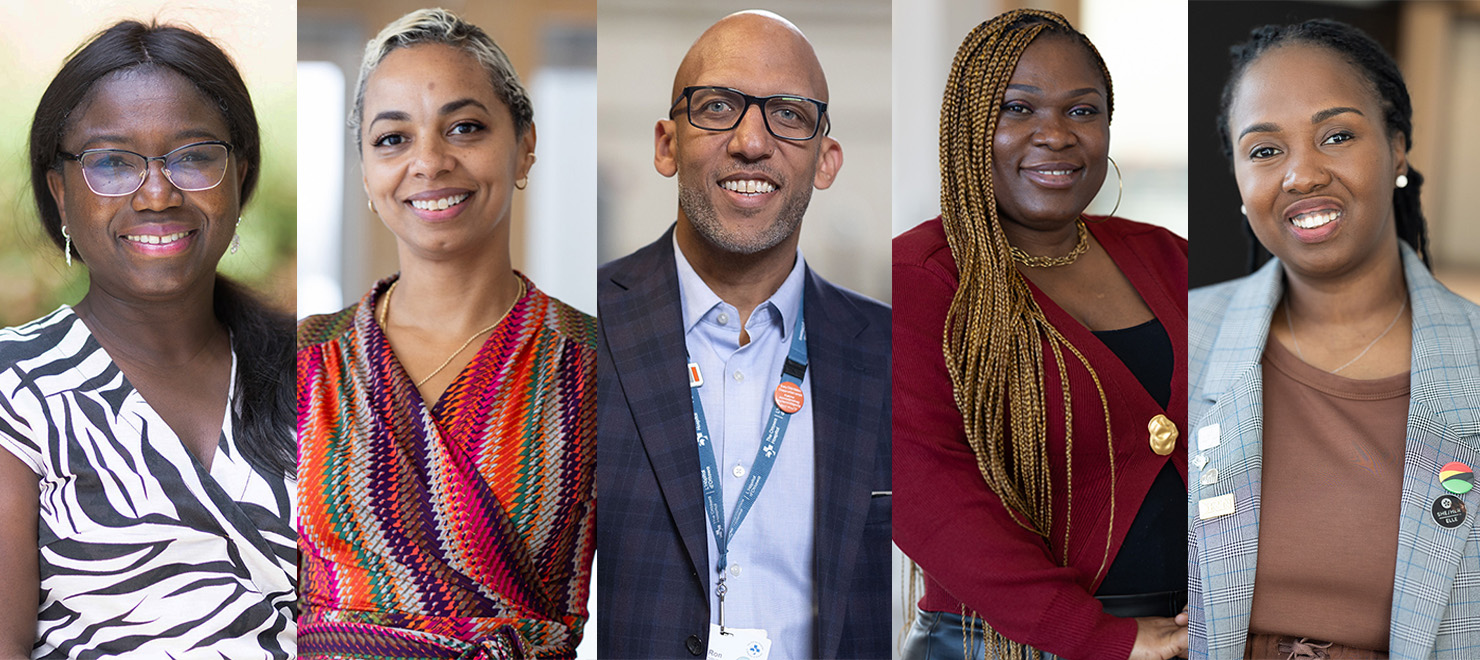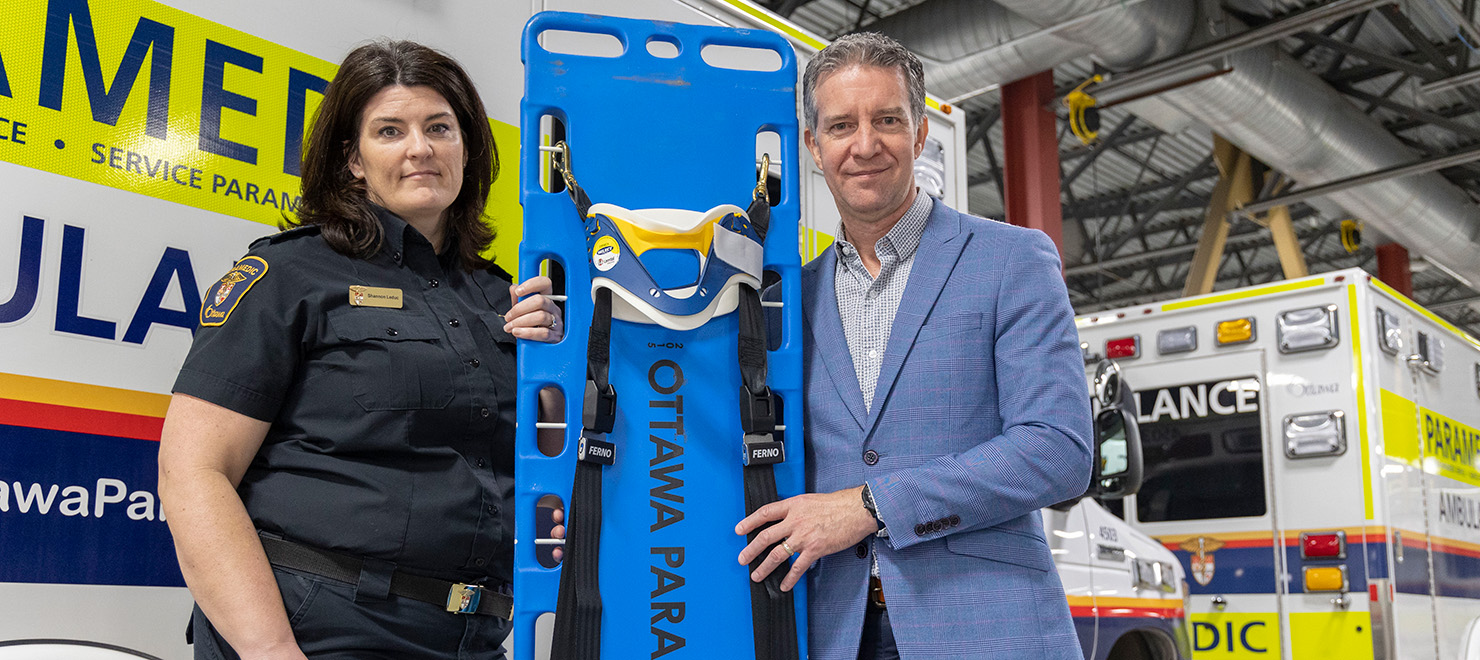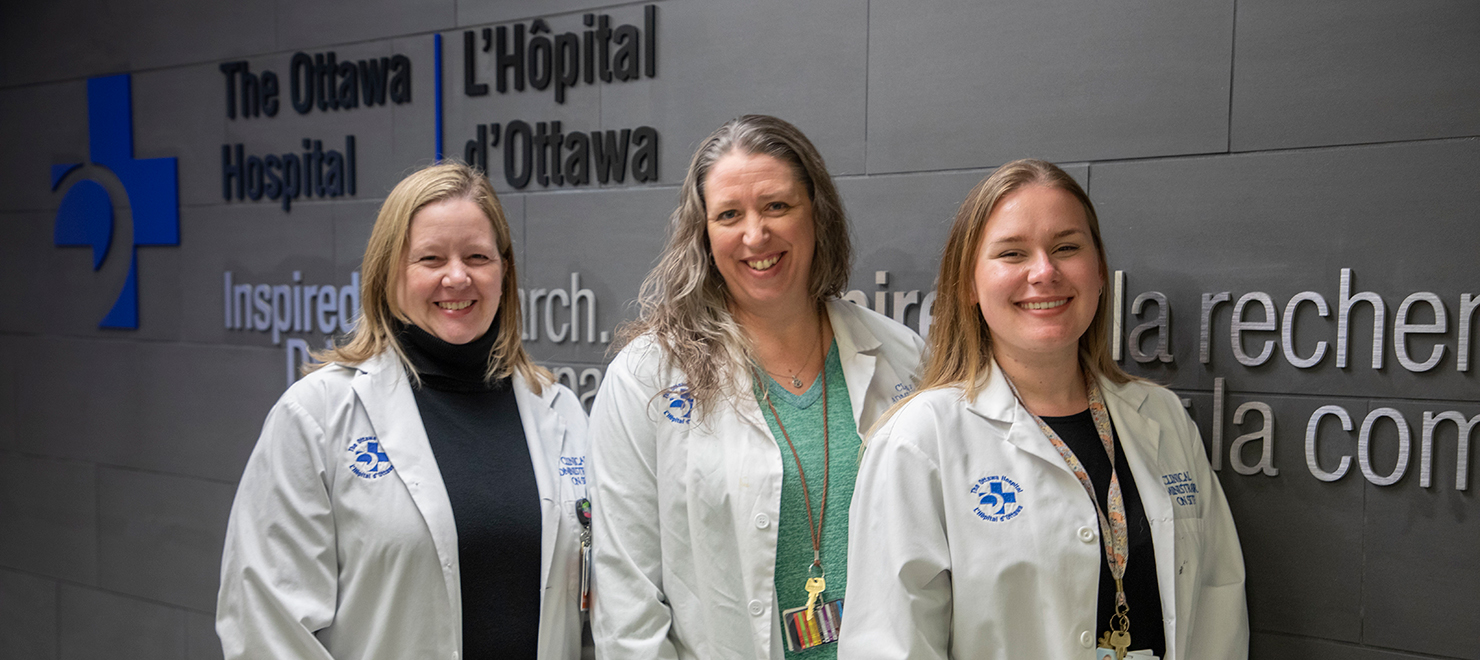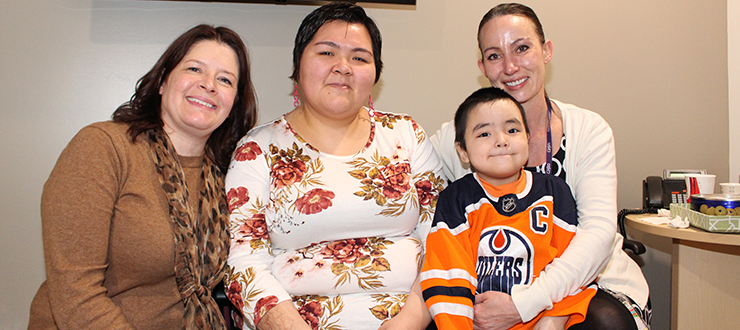
Nina Kautuq (centre) and six-year-old son Jutanie survived a tent fire that claimed the rest of their family. Carolyn Roberts (left), Indigenous Nurse Navigator at The Ottawa Hospital, and Kerri-Lynn Whyte (right), a nurse at CHEO, worked together to reunite Nina with the doctor and nurses who cared for her three children.
Nina Kautuq’s body is still healing from the 2015 tent fire that claimed the lives of her husband and three of her four children. But her emotional healing finally began in February, when she met the nurses and doctors who cared for her dying children.
Nina’s dreams were haunted by the raw pain of believing that her daughter Tinisha died alone in the hospital, far from home, explained Carolyn Roberts, Indigenous Nurse Navigator at The Ottawa Hospital.
“The guilt was almost debilitating for her,” said Roberts. “She couldn’t get past it. She would dream about it. ‘Was there something I could have done?’ She was terrified. ‘How could I let my daughter die alone in this strange place?’”
In August 2015, the family of six from Pond Inlet was camping when their tent caught fire. They were treated first in Nunavut and then airlifted south at different times. Husband Ikie Kautuq went to Winnipeg, where he died. Nine-year-old Tinisha died at CHEO, a pediatric health and research centre in Ottawa, before any family members arrived in Ottawa. Nina was airlifted to the General Campus of The Ottawa Hospital the next day, followed by 11-year-old daughter Roxanne, six-year-old son Anton and two-year-old son Jutanie (now six years old), who all went to CHEO.
“She just wanted to hold the hands of the last people who held her daughter’s hand.”
Hospital staff took Nina, still recovering from extensive burns, from the General Campus to CHEO to visit Roxanne and Anton before they died over the next few days. (The two hospitals are side by side and connected by a covered walkway.) But Nina could not shake the fear that Tinisha died alone.
“Her entire community was devastated by this,” said Gaby Jodouin, a case manager for the Ottawa Health Services Network Inc., which coordinates care for patients from Nunavut. Jodouin connected Nina with Roberts. “Nothing like this had ever happened before. The staff at CHEO were devastated as well.”
“Knowing CHEO, I knew there was no way she died alone,” said Roberts, who had worked at CHEO. “I knew some of the nurses involved. I asked Nina’s permission to approach CHEO. She just wanted to hold the hands of the last people who held her daughter’s hand.”
“We moved their beds so they could see each other.”
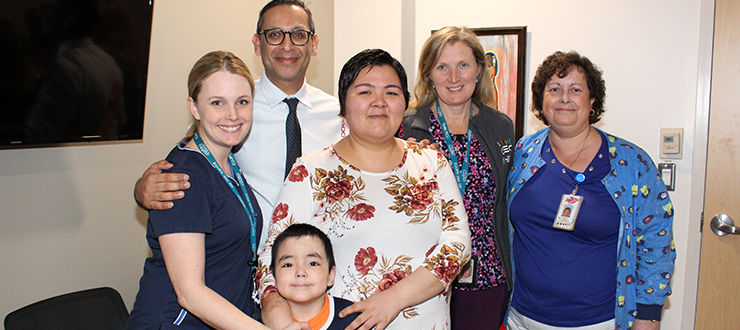
CHEO staff in the Pediatric Intensive Care Unit were thankful and relieved to meet with Nina Kautuq (centre) and son Jutanie. Brooke Akeson (left), Dr. Sonny Dhanani (back), Carol Ernewein, Suzanne Guay (right) and Kim Seguin (who joined the meeting by FaceTime) were some of the people who cared for Nina’s children. Nina’s husband and three children were all buried in their Edmonton Oilers jerseys because they were such huge fans.
Roberts approached Kerri-Lynn Whyte, a CHEO nurse who worked as the Trauma and Injury Prevention Coordinator when the children died. It took a while to arrange, but when Nina and Jutanie were in Ottawa for more skin-graft surgery in February, they were finally able to meet the nurses and doctors.
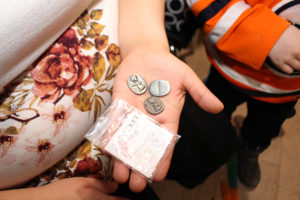
CHEO staff gave Nina Kautuq three pocket angels to remind her that they will never forget her children who died: 11-year-old Roxanne, nine-year-old Tinisha, and six-year-old Anton.
“We made sure that Tinisha was never alone,” Whyte assured Nina. “She had warm blankets and beautiful stuffed animals.”Jutanie played on the floor with a marble game while Whyte told her about Roxanne and Anton.
“They were never in pain. They had warm blankets all the time. Their feet were tucked in and someone was holding their hands. We can tell if children are in pain by their heart rate. A nurse watched the heart rate all the time…. I remember Roxanne calling out for her brother Anton. We moved their beds so they could see each other. They had each other and they were close. We always called over to the General to see how you were.”
Whyte put three small silver ‘pocket angels’ into Nina’s hands.
“They represent each one of your children. They are our gift to you to promise we will never forget.”
Once Nina’s tears subsided, she whispered: “Thank you. Wow. Thank you. Now I remember you. It’s important to put all the pieces together.”
“We’re going to be better doctors and nurses because of this.”
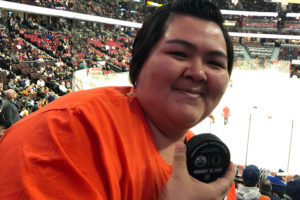
Later, Nina Kautuq fulfilled a life-long dream when she saw her family’s favourite team, the Edmonton Oilers, play the Ottawa Senators. “Seeing the Oilers play was a perfect, happy way to move forward,” said Carolyn Roberts.
Nina wanted to share her story publicly for several reasons: to help her heal, so that her children are not forgotten and to let people know about the kindness of the staff at CHEO and The Ottawa Hospital.
For their part, the nurses and doctors had also been haunted by the experience. They welcomed the meeting with Nina so they could begin to heal as well.
“I hope to pass on your strength to everyone involved,” said Dr. Sonny Dhanani, Head of the Pediatric Intensive Care Unit.
“We’re going to be better doctors and nurses because of this,” said Whyte. “You were so brave to live all these years with all that raw pain. Your children brought us together. Thank you.”
Nina took a deep breath and smiled through her tears.
“I feel like I lost 100 pounds,” she said. “It just means so much.”
The meeting helped ease her pain, but it will never go away.
“Nina is doing well,” Roberts said the next day. “She told me she was so happy to feel some peace. The relief she felt was palpable.” Nina slept well that night.

Support patient care and research at
The Ottawa Hospital
You might also like…
Novice nurses and their mentors learn and grow together
Discover how mentorships at The Ottawa Hospital facilitate a smoother transition into practice for novice nurses, allow experienced nurses to hone their leadership skills, and play a crucial role in retaining nurses from both generations.
February is Black History Month
Five members of The Ottawa Hospital’s Black community reflect on what this month means to them, their heritage and the importance of building a truly equitable health care system.
Does this backboard look comfortable to you?
Imagine this: You’re flat on your back, strapped tight to a rigid backboard, unable to move at all. Fortunately, this is no longer the reality for most low-risk trauma patients when they’re brought to hospital in our province. Find out how researchers at The Ottawa Hospital teamed up with paramedics across Ontario to make the journey a lot more comfortable.
The place to be: The Ottawa Hospital recognized as one of Canada’s most admired corporate cultures
The Ottawa Hospital (TOH) has been named one of Canada’s most admired corporate cultures. Guided by compassion and commitment to patient care, TOH has developed a workplace culture that inspires confidence and trust in our employees, patients and family members.
Meet the team that brings CAOS every night
Don’t let the CAOS team’s name fool you. Find out how these nighthawks help make sure everything runs smoothly at our campuses and satellite sites after hours.
These nurses invite you to recycle their idea
At The Ottawa Hospital, we strive to lead in sustainable health care — something we can only achieve with the help of our frontline staff. Geriatric medicine nurses Caiti and Sabrina rallied their unit together to optimize recycling and divert waste from the landfill. Find out how they binned it to win it (And we can’t promise you that that’s the last recycling pun in this article!).


 To reset, hold the Ctrl key, then press 0.
To reset, hold the Ctrl key, then press 0.
